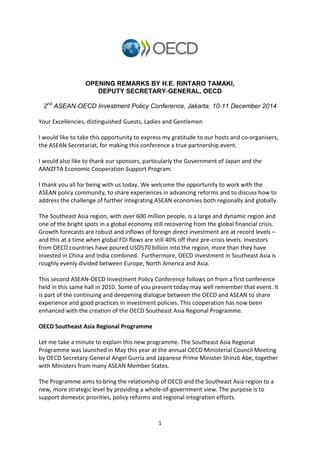
OECD Deputy Secretary-General Rintaro Tamaki's opening remarks at the 2nd ASEAN-OECD Conference on investment policy in Southeast Asia
- 1. 1 OPENING REMARKS BY H.E. RINTARO TAMAKI, DEPUTY SECRETARY‐GENERAL, OECD 2nd ASEAN‐OECD Investment Policy Conference, Jakarta: 10-11 December 2014 Your Excellencies, distinguished Guests, Ladies and Gentlemen I would like to take this opportunity to express my gratitude to our hosts and co‐organisers, the ASEAN Secretariat, for making this conference a true partnership event. I would also like to thank our sponsors, particularly the Government of Japan and the AANZFTA Economic Cooperation Support Program. I thank you all for being with us today. We welcome the opportunity to work with the ASEAN policy community, to share experiences in advancing reforms and to discuss how to address the challenge of further integrating ASEAN economies both regionally and globally. The Southeast Asia region, with over 600 million people, is a large and dynamic region and one of the bright spots in a global economy still recovering from the global financial crisis. Growth forecasts are robust and inflows of foreign direct investment are at record levels – and this at a time when global FDI flows are still 40% off their pre-crisis levels. Investors from OECD countries have poured USD570 billion into the region, more than they have invested in China and India combined. Furthermore, OECD investment in Southeast Asia is roughly evenly divided between Europe, North America and Asia. This second ASEAN‐OECD Investment Policy Conference follows on from a first conference held in this same hall in 2010. Some of you present today may well remember that event. It is part of the continuing and deepening dialogue between the OECD and ASEAN to share experience and good practices in investment policies. This cooperation has now been enhanced with the creation of the OECD Southeast Asia Regional Programme. OECD Southeast Asia Regional Programme Let me take a minute to explain this new programme. The Southeast Asia Regional Programme was launched in May this year at the annual OECD Ministerial Council Meeting by OECD Secretary-General Angel Gurría and Japanese Prime Minister Shinzō Abe, together with Ministers from many ASEAN Member States. The Programme aims to bring the relationship of OECD and the Southeast Asia region to a new, more strategic level by providing a whole-of-government view. The purpose is to support domestic priorities, policy reforms and regional integration efforts.
- 2. 2 The Programme aims to foster the exchange of good practices and mutual learning among policy makers in OECD and ASEAN countries. The structure is designed to encourage a systematic exchange of experience to develop common solutions to regional and global challenges. It is comprised of thematic Regional Policy Networks, which will build on the work programme of substantive OECD and existing Southeast Asian bodies and dialogue processes. These networks will cover the areas of investment, taxation, education and skills, small and medium-sized enterprises, regulatory reform, as well as connectivity and public- private partnerships. Initiatives are also being developed on trade, gender, innovation and the 2015 edition of OECD Economic Outlook for Southeast Asia provides an overview of macro-economic developments in the region and beyond. But the main emphasis of the Programme is on concrete deliverables and I would like to highlight only a few first achievements of the Programme which support key areas of the emerging ASEAN Economic Community: o ASEAN Leaders at their last summit in Myanmar welcomed the ASEAN Principles for Public-Private Partnerships for infrastructure development and the chair’s statement thanked the OECD for its contribution to the elaboration and promotion of the Principles. o The ASEAN SME Policy Index 2014 developed jointly by the Economic Research Institute for ASEAN and East Asia and the OECD, officially launched at the OECD Southeast Asia Regional Forum in Bali last March, is used by countries like the Philippines, Indonesia and Cambodia to inform their national SME development strategies. o ASEAN Member States also contributed to the update of the Policy Framework for Investment, an instrument underpinning OECD’s work in investment. o All Regional Policy Network are currently conducting meetings, and tomorrow, after this conference, the first RPN on Investment will take place, building on the investment policy reviews that have been undertaken or are currently underway in the region. Investment Policy Conference But now let me return to the subject at hand. Today and tomorrow, we will be talking about investment policy and its role in regional integration. Cross-border flows of investment are an important pillar of ASEAN integration. As stated in the ASEAN Economic Community Blueprint, a sound and open investment regime is key to enhancing ASEAN’s competitiveness in attracting FDI as well as intra-ASEAN investment. The various sessions over the next two days will look at policy reforms at the national and regional levels, drawing on the Investment Policy Reviews undertaken in the region, including the most recent one of Myanmar which was completed this year. We are very honoured that Professor Urata has agreed to moderate the first high-level session.
- 3. 3 The first day will also look at how to strengthen the legal environment for investment in ASEAN, including both the national legislative frameworks and through the evolving approaches to investment treaties. The second day will look at how to strengthen regional and country-level investment promotion, thereby enhancing both regional and global supply chains. Speakers will also address the role of responsible business conduct in GVCs, a subject of increasing importance. This second ASEAN-OECD Investment Policy Conference comes at a propitious time. Cooperation between ASEAN and the OECD has deepened considerably and the series of Investment Policy Reviews in the region provides a basis for enhanced dialogue both within the region and with partners among OECD member countries. I wish you a fruitful discussion: we have much to learn from one another. Thank you, or as you say in Jakarta, Terima Kasih.
